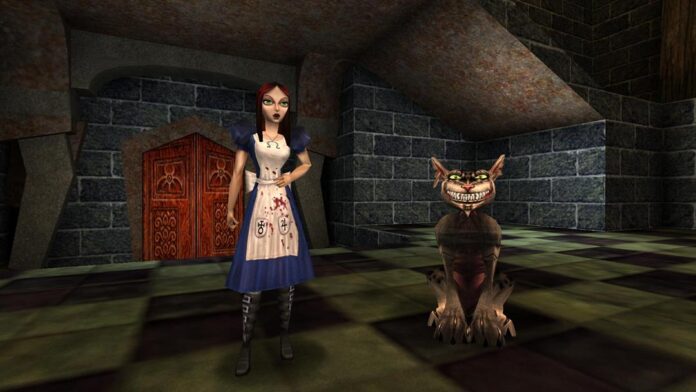I received American McGee’s Alice (2000) for the PC as a gift this summer, and it’s the first game I’ve completed in years. In it, you play as Alice on a spiral deep into a nightmarish version of Wonderland years after a certain tragedy. This is an edgy version of the well-known Alice’s Adventures in Wonderland tale by Lewis Carrol, in which the player is given a knife and forced to stab things. Considering the concept and year of release, it constructs itself with surprising grace.
The subversion of Wonderland may seem like an awfully tired concept from the start. After all, a world already packed to the brim with such deliberate weirdness seems ripe for corruption. However, American McGee’s Alice takes such intense care of its presentation and dialogue that it effectively straddles the line between being a generically uncanny remake and a completely new horror personality. It revives the brand’s established characters and crafts dialogue that suits them while simultaneously twisting everything to the limits of recognition. The Mad-Hatter rips apart time as assuredly as he dissects his companions, and the Queen of Hearts’ tendrils pierce the space between worlds. Almost everyone you meet speaks of Alice’s failure as a forgone conclusion as she struggles to maintain her confidence. Even the music seems to break down as you tread deeper.
The game features plenty of grotesque concepts and imagery, but they don’t feel designed to frighten. American McGee’s Alice isn’t a directionless celebration of gore, but rather a loose story of reaffirming self-worth dressed in bloody clothes. As such, it features no jumpscares and few other elements designed to invoke terror. Instead, the decrepit atmosphere reflects Alice’s internal turmoil and chips away at any notion of consistency.
The game received mainly positive reviews upon release, but was criticised for its simplistic fighting mechanics and puzzle design just as much as it was applauded for its innovative looks. Complex gameplay never felt like a priority, though. The game concentrates its talents in its environmental storytelling, and it delivers vocal performances that reciprocate this ambience loudly. I often found myself meandering and interacting with every possible thing, which often led me to where I needed to go anyways. I particularly like the Cheshire Cat, whom you can summon with a hotkey to deliver cynical advice and quips throughout.
It’s not often I play a game I find worth completing, let alone one based on an already popular franchise. What I love most about American McGee’s Alice isn’t how it effectively twists the low-hanging fruit Wonderland represents. It’s that, despite the obvious call of parody, the game draws its own unique identity from the fabric that made the original franchise so well-known. It sees the fruit for the whole tree, and as a result it remains timeless.


